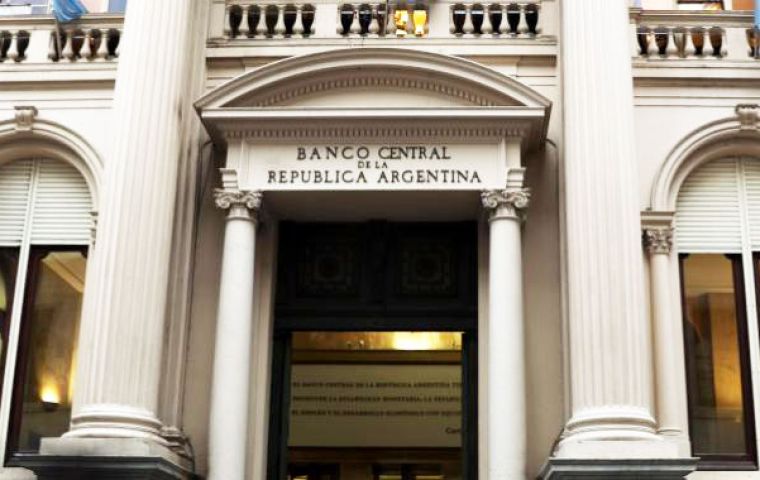MercoPress. South Atlantic News Agency
Argentina struggling to tame markets and inflation; talks for a currency swap with China
 Under the new central bank requirements, the largest banks must keep 31% of peso deposits in reserves, up from 28%. The move will absorb liquidity
Under the new central bank requirements, the largest banks must keep 31% of peso deposits in reserves, up from 28%. The move will absorb liquidity Argentina’s central bank said on Thursday it hiked reserve requirements by 3 percentage points for the country’s largest banks, as it tries to keep its plan for reducing short-term debt from adding to already high inflation.
Separately, the central bank has agreed to a US$ 4 billion currency swap with China to boost its reserves, local news website Infobae reported. A spokeswoman for the central bank said talks with China over the swap were “advanced”.
The monetary authority also sold on Thursday US$ 55 million in reserves at an average price of 29.7224 pesos per U.S. dollar, out of a total US$ 500 million offered in its only foreign exchange auction of the day. The peso closed 0.67% higher at 29.8 per U.S. dollar.
Argentina is undergoing a new bout of currency volatility, driven by concerns about inflation and a currency crisis in Turkey that has led to a sell-off in emerging market assets. A run on the peso earlier this year prompted the government to turn to the International Monetary Fund (IMF).
Under the new central bank requirements, the largest banks must now keep 31% of their peso deposits in reserves, up from 28%, according to a central bank spokesman. The move will absorb about 60 billion Pesos (US$ 2.01 billion) in liquidity from the market, according to the statement.
Earlier this week, the central bank announced it would speed up a plan to reduce outstanding Lebac short-term debt. It later lowered the interest rate offered on short-term notes to 45.04% in a Tuesday auction, when it sold 201.7 billion pesos in Lebacs.
The move to unwind the short-term debt was praised by the IMF, which said it would reduce a source of instability. But traders and economists warned it would increase the supply of pesos as investors turned their Lebac notes into cash, pressuring both the currency and the current inflation rate of 31.2%.
The central bank sold US$ 781 million in reserves on Wednesday after the peso hit a record low of 30.50 per U.S. dollar. Earlier in the week the bank also hiked its benchmark policy rate to 45% from 40%.




Top Comments
Disclaimer & comment rules-

-

-

Read all commentsThe time of booming commodity prices and cheap debt is over. It's a shame Argentina failed to capitalize on it and save for the rainy days. I remember back in 2005, finance minister Lavagna wanted to stash away earnings from soybean export taxes into a sovereign fund just like Chile did with copper, or Norway with its oil. He was sacked at the end of that year and his sovereign fund was looted to pay for unsustainable spending a year later. Such was the governance practiced by 12 years of Kirchnerismo.
Aug 19th, 2018 - 03:01 am +1Remember when the resident soothsayers derided the likelihood of the 15 level attainment?
Aug 17th, 2018 - 12:03 pm 0How far is 45?
“The central bank sold US$ 781 million in reserves...after the peso hit a record low of 30.50 per U.S. dollar...the bank also hiked its benchmark policy rate to 45% from 40%.”
Aug 18th, 2018 - 08:09 am -1Is there anything else I need to say?
Guess not.
Commenting for this story is now closed.
If you have a Facebook account, become a fan and comment on our Facebook Page!